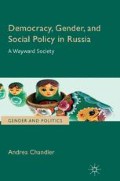Abstract
In an early transition from authoritarianism, hopes are high for social improvement. New elites promise to bring about a more equitable, more inclusive form of government. Incoming leaders may expect, that when incumbent leaders are swept from power, resources will become available, which can be redistributed to citizens through social policies. As we saw in Chapter 2, reformers can be highly optimistic that a government based on expertise, rather than political loyalty, can bring about economic recovery. By the middle of the transition, hope can yield to disillusionment if prosperity proves to be elusive. Reformers may now find themselves facing harsh criticism from emergent political rivals. With rule of law still in its fledgling stages, and policy directions still lacking detail and cohesion, the mid-transition can be a difficult time for a new government. The Yeltsin team did not initiate a broad-based public consultation on the direction of post-communist social policy. What role should the state play in providing for social well-being? How should that role differ from the arrangements of Soviet times? In the absence of an open conversation, Yeltsin’s social policy reform efforts were piecemeal, inconsistent, and half-hearted. Since the Yeltsin government missed the opportunity for dialogue with the citizenry on a new social contract, they left the topic of social citizenship open for various opposition groups to take initiative.
Access this chapter
Tax calculation will be finalised at checkout
Purchases are for personal use only
Preview
Unable to display preview. Download preview PDF.
Notes
Vitalii V. Linnik (2005) ‘Kontseptsii sotsial’noi politiki Rossii vse net i net’, Nezavisimaia gazeta, 19 May, 2.
V.P. Galaganov (1993) ‘Rossiiskoe sotsial’noe obespechenie: problemy i perspektivy razvitiia’, Gosudarstvo i pravo, 12, 38–46.
Iu. Ol’sevich (1994) ‘Sotsial’noe partnerstvo v Rossii: imeiut’sia li predpo-sylki?’ Voprosy ekonomiki, 5, 60–70;
Aleksei Kochetov (1993) ‘Istoki “novoi” sotsial’noi struktury’, Svobodnaya mysl’, 9, 66–73;
Yurii Sukhotin (1994) ‘Stabilizatsiia ekonomiki i sotsial’nye kontrasty’, Svobodnaya mysl’, 1, 21–33.
B. Rakitskii (1993) ‘Polozhenie naseleniia Rossii: sotsial’naia nadlomlennost’ pri pryzhke v rynok’, Voprosy ekonomiki, 4, 53.
Irina Nevinnaia (1995) ‘Nel’zia otkladyvat’ zhizn’ na zavtra’, interview with Liudmila Bezlepkina, Minister of Social Protection, Rossiiskaia gazeta, 30 May, 1–3.
L. Abalkin (1998) ‘Nazrevshie peremeny’, Voprosy ekonomiki, 6, 4–5.
Report of the Institute of Economics of the Russian Academy of Sciences L. Abalkin et al. (1998) ‘Sotsial’nye prioritety i mekhanizmy ekonomicheskoi preobrazovanii v Rossii’, Voprosy ekonomiki, 6, 10–67. The quotation is from p. 10.
Serguey Braguinsky and Grigory Yavlinsky (2000) Incentives and Institutions: The Transition to a Market Economy in Russia. Princeton, NJ: Princeton University Press, pp. 195–200, 251, 263.
Verkhovnyi Soviet Rossiiskoi Federatsii (1993) Stenograficheskii otchet, 6-aia sessiia, biulleten’ 38, ch. 2, 10 June, 36–7.
John A. Hall (1994) ‘After the Fall: An Analysis of Post-Communism’, British Journal of Sociology, 45(4), December, 525–42.
Olga Shevchenko (2009) Crisis and the Everyday in Postsocialist Moscow. Bloomington, IN: Indiana University Press, 58–9.
Aleksandr Solzhenitsyn, in Gosudarstvennaia Duma (1994) Stenogramma zasedanii, biulleten’ 61, 28 October, 32.
Aleksandr Solzhenitsyn, in Gosudarstvennaia Duma (1994) Stenogramma zasedanii, biulleten’ 61, 28 October, 32.
Aleksandr Solzhenitsyn, in Gosudarstvennaia Duma (1994) Stenogramma zasedanii, biulleten’ 61, 28 October, 32.
Aleksandr Solzhenitsyn, in Gosudarstvennaia Duma (1994) Stenogramma zasedanii, biulleten’ 61, 28 October, 32, 35.
Valentina Nikiforova (1995) ‘Sozdan Vserossiiskoi zhenskii soiuz’, Pravda, 5 December. 1.
Matthew Wyman (1997) ‘The Russian Elections of 1995 and 1996’, Electoral Studies, 16, 1, 83.
Boris Yeltsin (1995) ‘Khvatit’ nachinat’ zanovo s chistogo lista’, Rossiiskaia gazeta, 16 December, 1.
Boris Yeltsin (1995) ‘Budem vmeste’, Dom i otechestvo, 11–24 May, 2.
Ukaz Prezidenta Rossiiskoi Federatsii (1992) ‘O dopol’nitelnykh merakh po sotsial’noi podderzhke naseleniia v 1992 g’, Vedomosti Sovet Narodnykh Deputatov RSFSR i Verkhovnogo Soveta RSFSR, 1, 2 January, 46–7;
Ukaz Prezidenta Rossiiskoi Federatsii (1992) ‘O povyshenii razmerov sotsial’nykh posobii i kompensatsionnykh vyplat sem’iam s det’mi i drugim kategoriiam grazhdan’, Vedomosti Sovet Narodnykh Deputatov Rossiiskoi Federatsii i Verkhovnogo Soveta Rossiiskoi Federatsii, 47, 26 November, 3490.
Reuters (1995) ‘Communist Surge in Russia’, New York Times, 30 December, A1.
See for example V.I. Kozlov (1995) ‘Vymiranie russkikh: istoriko-de-mograficheskii krizis ili katastrofa?’ Vestnik Rossiiskoi Akademii Nauk, 65(9), 771–4.
For example, William C. Cockerham, Brian P. Hinote and Pamela Abbott (2006) ‘Psychological Distress, Gender and Health Lifestyles in Belarus, Kazakhstan, Russia and Ukraine’, Social Science and Medicine, 63, 2381–92;
William Alex Pridemore (2006) ‘Heavy Drinking and Suicide in Russia’, Social Forces, 85(1), September, 413–30;
Gerdi Weidner and Virginia S. Cain (2003) ‘The Gender Gap in Heart Disease: Lessons from Eastern Europe’, American Journal of Public Health, 93(5), May, 768.
See for example Pamela Abbott and Claire Wallace (2007) ‘Talking About Health and Well-Being in Post-Soviet Ukraine and Russia’, Journal of Communist Studies and Transition Politics, 23(2), 181–202;
Tanya Jukkala et al. (2008) ‘Economic Strain, Social Relations, Gender and Binge Drinking in Moscow’, Social Science and Medicine, 66, 663–74;
Ilkka Pietila and Marja Rutkonen (2008) ‘Coping with Stress and by Stress: Russian Men and Women Talking about Transition, Stress and Health’, Social Science and Medicine, 66, 327–38.
L. G. Luniakova (2001) ‘O sovremennom urovne zhizni semei odinokikh materei’, Sotsiologicheskoe issledovanie, 8, 87.
Sergei Kukhterin (2000) ‘Fathers and Patriarchs in Communist and Post-Communist Russia’, in Sarah Ashwin, ed. Gender, State and Society in Soviet and Post-Soviet Russia. London: Routledge, p. 85.
For example Lev Gudkov and Boris Dubin (1993) ‘Bez napriazheniia... zametki o kul’ture perekhodnogo perioda’, Novyi mir, 2, February, 242–53.
Author information
Authors and Affiliations
Copyright information
© 2013 Andrea Chandler
About this chapter
Cite this chapter
Chandler, A. (2013). Social Welfare in the Mid-Transition, 1995–2000. In: Democracy, Gender, and Social Policy in Russia. Gender and Politics series. Palgrave Macmillan, London. https://doi.org/10.1057/9781137343215_5
Download citation
DOI: https://doi.org/10.1057/9781137343215_5
Publisher Name: Palgrave Macmillan, London
Print ISBN: 978-1-349-46553-8
Online ISBN: 978-1-137-34321-5
eBook Packages: Palgrave Political & Intern. Studies CollectionPolitical Science and International Studies (R0)

